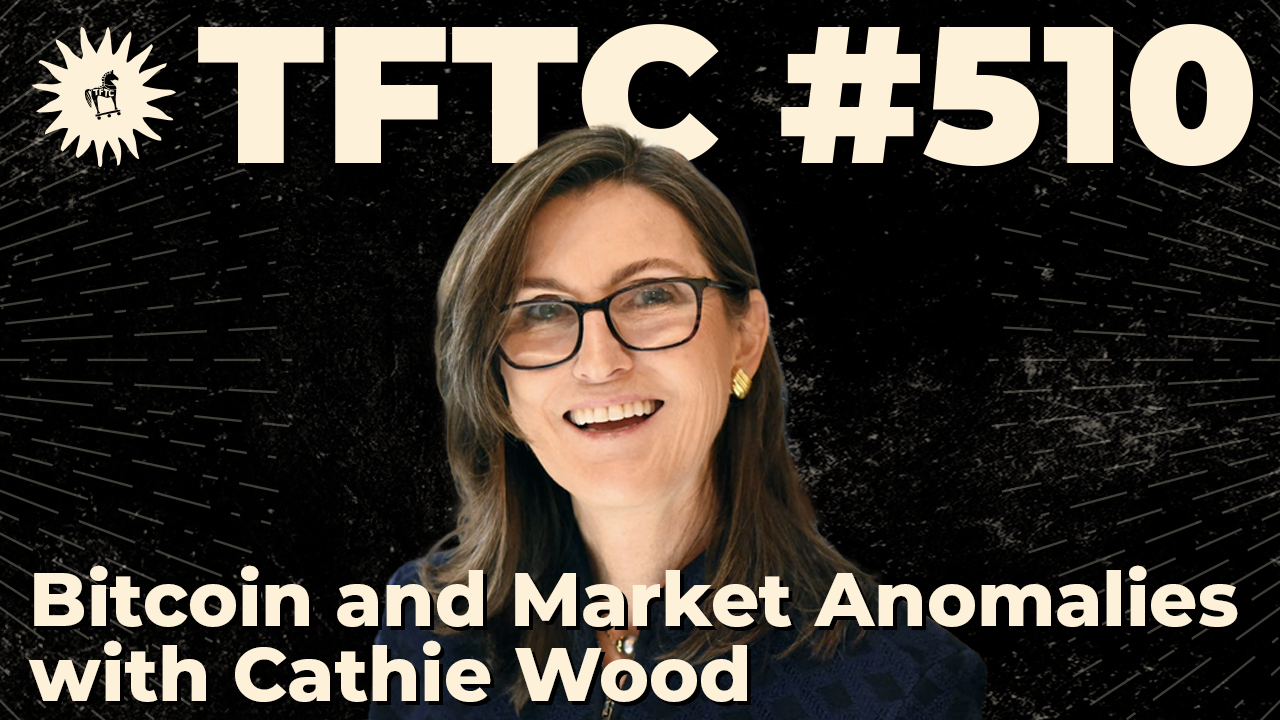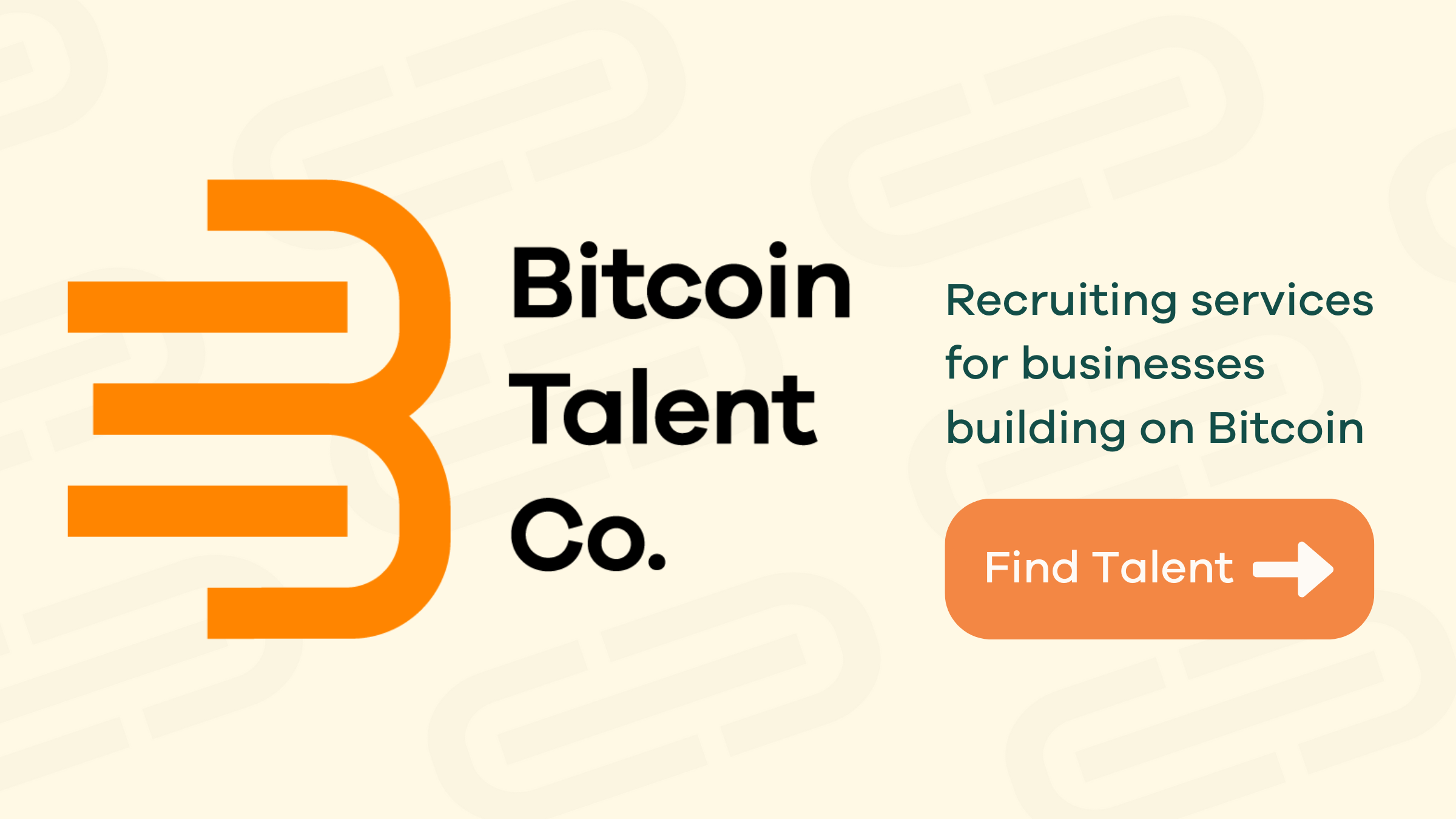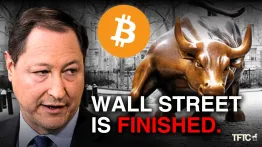
Cathie Wood discusses Bitcoin's role as a revolutionary monetary technology, emphasizing its potential to stabilize economies and integrate with AI.

In this episode of TFTC we discuss the evolution of Bitcoin as a global monetary system, its comparison with past technologies, and its role in emerging markets. Cathie's highlights Bitcoin's unique positioning as an unprecedented convergence of technology, monetary policy, and asset class, emphasizing its potential to offer an insurance policy against currency devaluation and economic turmoil.
The conversation also touched upon El Salvador's adoption of Bitcoin, its impact on the nation's economy, and the broader implications for other emerging markets. Cathie expressed her views on the cyclical nature of fiat currency crises in these regions, and how Bitcoin can serve as a stabilizing force against such volatility.
Furthermore, we covered the intersection of Bitcoin with AI, the energy sector, and sovereign nation balance sheets. Cathie explains how Bitcoin, combined with AI, can redefine microfinance and labor division, particularly in developing countries. The discussion also explored the potential of Bitcoin mining to optimize energy efficiency.
Lastly, the conversation shed light on Ark's approach to research based on technology convergence across sectors and the firm's initiative to support Bitcoin core developers. Cathie's insights provided an optimistic outlook on the future of innovation, productivity, and market dynamics driven by disruptive technologies like Bitcoin and AI.





Cathie's perspective on Bitcoin as a convergence of technology, monetary system, and asset class, along with her insights into the role of Bitcoin in emerging markets, AI, and energy, painted a picture of a transformative future. The overarching message pointed towards a future where Bitcoin, alongside other technologies like AI, can drive progress, innovation, and economic stability.
0:00 - Intro
0:14 - Bitcoin’s monetization compared to past trends
3:22 - Sovereign bitcoin funds
8:58 - River & Unchained
10:14 - Why is bitcoin outpacing gold
14:18 - Sharpe ratio convinces institutional investors
16:49 - Elections and consumer sentiment
25:19 - Inflation and money velocity
31:58 - Gradually, Then Suddenly & Zaprite
33:35 - Is the level of chaos unprecedented?
38:41 - AI and bitcoin
42:35 - Internet money
45:32 - Energy narratives
49:46 - Converging technologies
57:06 - Ark ETF and bitcoin dev support
1:05:47 - Plugs
00:00:02:16 - 00:00:03:26
Marty
Cathie Wood, welcome to the show.
00:00:03:27 - 00:00:06:09
Cathie
Oh, I'm happy to be here, Marty. Thank you for inviting me.
00:00:06:09 - 00:00:35:01
Marty
Well, thank you for coming. And I want to start off by complimenting you on forming an incredible team. I'm personally good friends with Yacine and David. And to see them end up at Ark has been made me very happy because there are two aces in the Bitcoin space. Their analysis and everything they've done to help me better understand Bitcoin has really helped me in my trajectory in this space and see them landed.
00:00:35:01 - 00:00:37:24
Marty
Ark and Work with You has been incredible.
00:00:37:24 - 00:01:02:07
Cathie
Oh, thank you. No, we we are the blessed ones, you know, to have them there. They're incredible. We have four, four people now working on crypto broadly. And of course Yacine and David really leading the charge on Bitcoin. So very blessed, very blessed, so smart, so humble, so passionate about the space, which is great.
00:01:02:14 - 00:01:29:16
Marty
And with that in mind, I think one jumping off point I want to start this conversation is obviously you've been in the markets for quite some time. You've got a long term view. You've seen a lot of different market cycles, a lot of different trends, particularly in track in tech. Excuse me, how does the emergence of Bitcoin and its current monetization compare to trends that you've seen in the past?
00:01:29:19 - 00:01:59:26
Cathie
Well, it is like nothing I have seen in the past, but it is bringing everything I love together. So this idea of Bitcoin being a new well, a global monetary system that fits right into my economics. Art Laffer and I have been he's been so excited about this since we did our first white paper in collaboration with him in 2015.
00:01:59:29 - 00:02:33:18
Cathie
He's become so excited about it that, you know, we he just joined me in El Salvador to meet with President Kelly to advocate for, you know, not only helping help, he doesn't need any help on the Bitcoin side of it, but but on the economic side, you know, you get economic reform, educational reform, Bitcoin. And I. You know, working together, converging and you have an explosive opportunity there.
00:02:33:18 - 00:03:03:03
Cathie
So but global monetary system so it is that Bitcoin technology you know the the layer of the internet the really developers forgot in the early nineties because they had no idea that commerce financial services would have you would take place on it and then a new asset class. You know three and one. There's never been anything like this.
00:03:03:05 - 00:03:31:28
Marty
It's been extremely exciting to, to be writing the Bitcoin wave over the last 11 years and going back to El Salvador. I mean, I've thought about Bitcoin and how its impact on my life individually. Now we're entering that territory where El Salvador leading the charge, making Bitcoin legal tender, putting it on their sovereign balance sheet at the nation state level, honing in on El Salvador.
00:03:31:28 - 00:03:39:15
Marty
Considering the fact that you were just there, what kind of opportunities do you think Bitcoin unlocks for them specifically?
00:03:39:18 - 00:04:19:24
Cathie
Well, I think I, I think that President BUCHELE is leading what I believe will be a movement by more enlightened leaders in emerging markets who are trying to break from the past. And, you know, the horrible cyclical and hugely cyclical booms and busts and especially devaluations, which is a very relevant topic today. You know, I'm shocked to see the Nigerian naira plummeting 50, 60% over the last year or so.
00:04:19:26 - 00:04:47:08
Cathie
The Egyptian pound dropping 40% in March. I mean, think about how how crushing that is to purchasing power and wealth of individuals. And so Bitcoin and I know I don't have to tell this community really as an insurance policy against what what that is, which we believe it's confiscation of wealth. So I think it's becoming more and more relevant.
00:04:47:11 - 00:05:18:09
Cathie
You know, the dollar has been going up, the dollar's up a lot in the last ten, 12 years relative to most currencies. I don't think many people understand how much it is up and that that is, you know, debilitating to some of these emerging markets. And so, you know, Bitcoin couldn't come around at a better time. You know, if you have an Internet connection and a smartphone, you have access to this insurance policy.
00:05:18:11 - 00:05:47:29
Cathie
And I think more and more individuals are going to take advantage of it. And the smart leaders in these countries are going to put a Bitcoin on their balance sheets because one of the devastating consequences of reserves running out is the IMF comes in and does all the wrong things. It raises tax rates. It cuts spending at a time when countries are already reeling.
00:05:48:01 - 00:06:10:21
Cathie
It's it's, you know, a failed strategy that they you know, it is their go to. And I don't understand if I were a leader in an emerging market and I think even El Salvador is looking for funds from the IMF. But if I were a leader in an emerging market, I'd say, okay, well, you know, this really doesn't work.
00:06:10:21 - 00:06:31:13
Cathie
You know, in terms of moving countries in a healthy way out of distress. It does longer term, if you give them money and control everything, then you know, something will happen, something will change, but not the right things. It's not a market driven approach.
00:06:31:15 - 00:06:55:05
Marty
That's the literal definition of insanity. And I ran these numbers last year, and I might be a little fuzzy on the exact details, but Argentina, as an example of this, I think between 1956 and 2023 when I did this analysis, they had 296% annualized inflation. And over that period they had gone to the IMF for loans 21 times.
00:06:55:07 - 00:07:01:19
Marty
So like once every three years they were going to the IMF with the idea that if we do this will fix our economic problems.
00:07:01:19 - 00:07:02:27
Cathie
And and then default.
00:07:02:29 - 00:07:15:12
Marty
Yes, it just doesn't work. But if people have this perception of the IMF as this prestigious banking institution, that is going to solve problems, but historically, it simply does not seem.
00:07:15:12 - 00:07:32:03
Cathie
To be the case. I'm just looking at the empirical evidence. You know, when I know the IMF is coming in, you know, for a while the country is going to be in under a lot of duress, you know, in terms of an adjustment, the kind of shock they administer.
00:07:32:11 - 00:07:53:15
Marty
Yeah, that's for emerging markets. I think another thing, just global effects right now. You mentioned emerging markets, obviously Venezuela, Nigeria, we've seen Lebanon, Turkey, Egypt, Sri Lanka. And now it's beginning to weaken to the more established economies like the yen. It's pushing 158 right now.
00:07:53:18 - 00:08:24:17
Cathie
That had it crossed, got to 161 or 162 before they got serious about not just jawboning but doing something about it. Yeah, that that that's an interesting one because, you know, the the yen has been over the years considered one of the safest currencies. But during this period when the dollar has appreciated, the yen has been cut in half relative to the dollar.
00:08:24:19 - 00:08:28:02
Cathie
That's we're big trading partners right. Yeah.
00:08:28:05 - 00:08:42:09
Marty
And it's I think it's hard for people to fathom that. And that's one of the insidious things of currency debasement is it's death by a thousand cuts. Frog boiling a water wake up one day and the Bank of Japan is having to intervene more than they'd like to.
00:08:42:09 - 00:08:42:22
Cathie
Yeah.
00:08:42:29 - 00:08:43:23
Marty
To defend the power.
00:08:43:24 - 00:08:46:18
Cathie
Yes. That has been one of the big surprises of the year.
00:08:46:20 - 00:09:09:09
Marty
Yeah. And how I want to be too bombastic here. Like how imperative do you think it is for countries to think to begin thinking seriously about diversifying their effects reserves or just a reserve assets generally towards something like Bitcoin?
00:09:09:13 - 00:09:50:15
Cathie
Well, given what we're seeing in in the private sector in the U.S., um, and hearing from state treasurers, we who, who we're working with, um, the movement is already started. Um, now for example, the state of Wisconsin, I believe has put a number of not they're not self-custody in Bitcoin or anything, but they have put some of the spot ETFs in their pension plans.
00:09:50:17 - 00:10:19:11
Cathie
And you know that that to me speaks loudly. And we're also seeing bond funds. I wouldn't think they'd be the first to embrace Bitcoin. I just think of bonds in a different way. But they've been in a world of hurt recently because of Fed policy, and so bond managers are starting to diversify into Bitcoin. There was one very visible one.
00:10:19:11 - 00:10:47:05
Cathie
I've forgotten the name, but the 13 filings came out and we're beginning to see actually was very interesting For every manager that added gold in the last quarter. Um, ten added bitcoin. So both of them through ETFs for, for the most part that, that was illuminating. That was illuminating.
00:10:47:07 - 00:11:07:21
Marty
10 to 1 outpacing in Bitcoin's favor. And what do you think is driving that? Do you think it's people recognizing that Bitcoin is superior to gold or do you think it's institutional investors recognizing that Bitcoin has much more potential upside compared to gold?
00:11:07:24 - 00:12:14:05
Cathie
Well, it probably is the latter because we're at such an early stage of institutional involvement with, uh, with Bitcoin as opposed to gold. And I also think I'd like to think that our, our study, uh, as we were trying to reach institutional investors, our study was basically shows that because Bitcoin has such a low correlation to other financial assets, that and because we believe it is a new asset class that any institutional investor, uh, now that the SEC has given, you know, this, this wrapper at least the ETF, the green light to hold Bitcoin, every institution has to consider it because it is now a matter of, okay, what's your competition doing if, when, when
00:12:14:05 - 00:12:44:29
Cathie
there's a new asset class that has a low correlation of returns to other assets, what that usually means is if you add to your existing portfolio a position in Bitcoin that over time your return per unit of risk is going to be higher than the competition. So it will become a competitive dynamic out there.
00:12:45:01 - 00:12:46:25
Marty
Is that where you focus in on the Sharpe ratio and just.
00:12:46:26 - 00:12:48:09
Cathie
Yes, yes, yes.
00:12:48:09 - 00:12:49:23
Marty
Look at how high this is compared to everything else.
00:12:49:23 - 00:12:53:25
Cathie
Yes. Yes. Speaking their language.
00:12:53:28 - 00:13:09:10
Marty
And speaking and speaking their language. In your experience at ARK and interfacing with a lot of these institutional investors, what has been a most potent pitch for Bitcoin, specifically, what resonates the most at an institutional investor?
00:13:09:10 - 00:13:10:06
Cathie
That last one.
00:13:10:06 - 00:13:11:29
Marty
The short version is this.
00:13:11:29 - 00:13:42:16
Cathie
Yes, the you're the odds of a higher risk adjusted returns for a given portfolio if you allocate a position to, um, to Bitcoin that resonates, that resonates. Um, I mean, in the early days our first whitepaper was in 2014, the year we found it Ark and um, you know, we were, we were facing ridicule and all kinds of it.
00:13:42:17 - 00:14:23:24
Cathie
I mean, you know, the, in ten years the flip has been amazing. And I do think, I do think what's happening as well is what's going on in Washington. So 15, 21 I'm not quite sure if that's the nickname for it, but um, to have 76 Democrats sign on to that, including Nancy Pelosi is like what? I mean that that has awakened a lot of people to its broader acceptance instead of this kind of radicalized form of money, which is how people were thinking about it in the old days.
00:14:23:27 - 00:14:56:06
Cathie
Now new asset class. Good for, uh, good for our citizens. Freedom, you know, lots of our values. Um, very interesting. It's a for many people, it's, you know, this year is a one issue election. And I think that vote spoke loudly that, okay, there was this dynamic Democrats against Republicans for, for the most part. And now that's changing quickly.
00:14:56:09 - 00:15:10:28
Cathie
So quickly. And I think President Trump saying the things you said recently, but also taking campaign contributions in crypto, trying to reach the community, that's also quite significant.
00:15:11:01 - 00:15:29:15
Marty
It was honestly quite astonishing to see how quickly, uh, the Democratic side of the aisle turned on a dime. I think there was a lot of noise made by people in the industry and they were like, okay, I guess we need to listen now. It's crazy to think and it's beautiful how Bitcoin having cycles line up for the election.
00:15:29:18 - 00:15:50:05
Marty
You have this, you have this supply inflation shock to the network every 210,000 blocks, which lines up with these election years. And yeah, you have some beautiful magic that can culminate. And I think particularly this election cycle because 15 years and $1.4 trillion market cap, it's impossible to ignore Bitcoin.
00:15:50:05 - 00:15:51:06
Cathie
And so that's right.
00:15:51:09 - 00:15:59:25
Marty
Watching it be pushed to the floor of the conversation leading up to the presidential election is like, holy crap, where how did we get here?
00:15:59:28 - 00:16:34:12
Cathie
I guess Satoshi really understood. I mean, really understood this dynamic. I'm kidding. I'm not sure if he he or it or they, you know, thought about that. But there is something called the well in in equity markets. Actually, it's the first project I ever did when I got into the business. No, this would have been the first more economics political project I did because the first one was about Hong Kong, 1997.
00:16:34:15 - 00:17:06:26
Cathie
But was this four year election cycle and how the equity markets trade around the election cycle? And so I did. I, I pretended that the four years were the equivalent of one year and applied seasonal adjustment. The census at the time it was X11 to it to find out the seasonality. And there definitely is quote unquote seasonality around the four year presidential election cycle.
00:17:07:01 - 00:17:14:11
Marty
And does it trend in favor of one party over the other, or is it really dependent on the individual?
00:17:14:12 - 00:18:00:26
Cathie
It no, it didn't. It has more to do with the dynamics around election. So in the fourth year, as the election is approaching, usually we have a good market because now this one this year I think is not so much what I'm talking about. A lot of things are different this year, but typically the fourth year is where, you know, the the incumbent administration, which usually has the power of the purse, you know, basically throws as much at the economy and at consumer sentiment as possible, which they are trying to do.
00:18:00:26 - 00:18:29:25
Cathie
But consumer sentiment is terrible this year. But normally it's very good. And then in the first year, they really understand, okay, now we're going to have to administer the tough medicine, hope that it takes before the midterm elections and hope that we've turned around from taking whatever tough medicine needs to be put in place. And so depends on the party, what the tough medicine is very often.
00:18:29:28 - 00:18:41:09
Cathie
But that's what usually happens. First year of a presidential cycle is the first and second years are a little tough. Third and fourth years are pretty good.
00:18:41:12 - 00:18:49:06
Marty
And yeah, you mentioned it before, we have record and alluded to it again, but this seems like an anomalous year in terms of that trend.
00:18:49:08 - 00:19:27:01
Cathie
Yes. I mean, while the while technically the stock indices are up, what what we're seeing is amazing concentration, record breaking concentration. So I looked at a chart that Goldman Sachs did a month or so ago and it showed the ratio of the the market cap of the highest valued stock in the S&P 500 compared to the market cap of the stock at the 75th percentile.
00:19:27:01 - 00:20:05:25
Cathie
So the top stock in the bottom 25%, it is higher now than it's ever been. This this went back before the depression of the 1900s, 1920s, and it is worse than it was back then. So what's happening? What was happening in the Depression? In the Depression, you know, most people were wiped out. Right? Those who stayed in the stock market were you know, they were crowding into names that they knew wouldn't go bankrupt and therefore had, you know, they had bank balance sheets like Fort Knox.
00:20:05:25 - 00:20:35:03
Cathie
Right. And literally in the day, it probably was gold. So and so there was huge crowding in. And we're higher now than we were back then. But the good news for us, because we've been hammered in in this environment, the good news is as a market broadens out, let's say, as the risks abate. And I think that will come with lower interest rates, there's a big problem right then.
00:20:35:08 - 00:21:10:21
Cathie
The broadening out of the market advantages, you know, small, mid and, you know, the lower end of large cap stocks, relative to the mega caps because there has been so much crowding in. And I think that's going to happen this time as well. The other crowding in occurs right before we're going into a horrible bear market. So we're either going into a market that's going to broaden out and be a very good strong market or that that's what this is, what the concentration tells us.
00:21:10:28 - 00:21:37:17
Cathie
Or as in 1973 and 2000, we're going into a bear market, a bad bear market. I'm opting for the former, I think interest rates. I think we're getting all kinds of signals that interest rates are way too high. And the headline economic numbers, the headline inflation numbers, especially when it comes to shelter and so forth, are hugely lagging.
00:21:37:17 - 00:22:12:12
Cathie
And so I think the Fed's overdoing it now. And we're we're we've seen a rolling recession housing down autos, very weak, um, commercial real estate in a world of hurt office for obvious reasons but now multifamily because too much overbuilding and now the consumer seems to be cracking certainly at the edges low income is definitely if you look at consumer sentiment today, it is lower for low income and middle income earners or as low as it was in 0809.
00:22:12:15 - 00:22:34:18
Cathie
And and the higher income consumer is now starting to capitulate in terms of sentiment. Now, I know we got this is based on the university of Michigan Consumer sentiment index. Yesterday we got Conference board and it said confidence was up. Over the many years I've been in the business, Michigan has been the rate leading.
00:22:34:18 - 00:22:37:00
Marty
Indicator that was down way below.
00:22:37:06 - 00:23:08:00
Cathie
It was shocking last month, shocking and just so sorry, Marty, if you look at small business sentiment, so the NFA, IAB, National Federation of Independent Business puts out a survey. I know the person who started it in the late seventies. It is as low now as it was near the lows in 0809. It's because because small businesses cannot get funding.
00:23:08:03 - 00:23:16:16
Cathie
They cannot. And many bigger companies can't as well, because venture except for AEI is basically shut.
00:23:16:18 - 00:23:31:04
Marty
Yeah and then you factor in other metrics look at like 90 day 90 plus day delinquency rates beginning to rise to oh eight levels. It's it's heady out there and that's what I think that's and.
00:23:31:06 - 00:23:42:27
Cathie
That doesn't include buy now pay later which is not in any of these statistics but has been all the rage, especially with young people.
00:23:42:29 - 00:23:49:09
Marty
In that yeah the market's grown. I mean what was it, layaway in the nineties. Yes, but now it's been digitized.
00:23:49:10 - 00:23:50:01
Cathie
That's right.
00:23:50:05 - 00:23:51:18
Marty
You can do layaway on e-commerce.
00:23:51:20 - 00:23:54:04
Cathie
That's right. Right. That's exactly right.
00:23:54:07 - 00:24:13:09
Marty
Which is insane. And I guess the big worry that everybody has maybe is on Jerome Powell mind is stagflation. Like if these inflationary pressures are not tamed enough and he lowers rates like does that lead us to a inflation's an area that we do not want to be in.
00:24:13:11 - 00:24:50:10
Cathie
So I'm looking at a few leading indicators of inflation. And what's interesting about this question is art and I are disagreeing on this right now, and we have disagreed in the past. And so this is good because I want to be kept on my own toes. So Art would say, given the money monetary base unleashed during COVID, we have yet to see the inflation, you know, cycle play out.
00:24:50:12 - 00:25:22:09
Cathie
Now you can go back to oh eight, oh nine and he was making that case. And you'll notice we did not go into an inflation spiral. Why not? We didn't. And this is where this is the point we disagree on. I've always paid a lot of attention to the velocity of money, the rate at which it turns over and if you look at it over it, it peaked in a secular sense in 1997.
00:25:22:09 - 00:25:44:24
Cathie
I saw a chart recently that also peaked in 1997. I'm trying to remember what it is because I say, Wow, this is the only other thing I've seen that peaked that way back then. But anyway, it's been falling, although has cyclical increases, but in a trend sense is falling, you know, lower lows, lower highs and so that's what happened.
00:25:44:26 - 00:26:30:06
Cathie
That velocity during the beginning of the cycle did start up a but then collapsed. And what is that? That is people saying I'm scared I'm not going to spend as much. I need to save a little bit more. I'm afraid I'm going to lose my job. And if you look at those statistics and there are stats on this now, the number of people making $100,000 or more who are afraid of losing their jobs now is rising dramatically and to the point where if you look at its correlation with the unemployed rate in the past, I would put the future unemployment rate at somewhere in the 6 to 7% range.
00:26:30:09 - 00:26:54:26
Cathie
So if that is the environment we're in and the velocity of money, which has had a cyclical turn up but has not hit a new high, I think is in the process of turning down. If that turns down and at the same time money supply year over year is still negative, then you have one heck of a hit to GDP.
00:26:54:28 - 00:27:19:24
Cathie
So now Art, on the other hand, does not believe in the concept of velocity at all. He thinks it's a random a random walk, whereas I have watched it in the market be highly correlated to two things. One is optimism. So when optimism is up, that's the beginning of the cycle. It will move up. When optimism is moving down, it will move down.
00:27:19:25 - 00:27:45:03
Cathie
That's what I think is happening right now. The other thing it's correlated to is inflation. If people think that inflation is going higher, and that's why we're at a very tricky point in the cycle. If people think inflation is going higher, let's say it's going to turn around from three, three and a half and go higher. What they will do, what's the natural thing to do?
00:27:45:03 - 00:28:04:00
Cathie
If you think interest rates and inflation are going higher, what are you going to do? You're going to buy now before those prices and interest rates go up? I don't think that's going to happen, but I think art does. So there you are. You have our and so we can watch what happens here.
00:28:04:06 - 00:28:10:14
Marty
Yeah, that's I think the question everybody mind everybody's mind is what is Jerome Powell thinking about this? Because that's I think.
00:28:10:16 - 00:28:42:16
Cathie
I don't think he thinks about that. No, no, no, no, no. I think well, I think he thinks about his legacy, but I think he thinks about non-farm payroll, employment and and the Peace Corps deflator. Now, I can give you some statistics that on non-farm payroll employment were up. I think we're up about somewhere in the two and a half percent range year over year on the household employment metric were flat year over year.
00:28:42:18 - 00:29:26:01
Cathie
And if you look at surveys, temporary and permanent help help agencies, that world is crashing, including the wages. Wages have just taken a tumble and are well below where they were in 2019. So we're look, we arc and many other economists are looking at many other variables than just nonfarm employment. And then on inflation, the inflation indicator that I and I've presented this to art as well as you can tell, I admire him great thing and I want the two to debate him and and understand where he's coming because it's not in the day to day market.
00:29:26:03 - 00:29:58:09
Cathie
So the one I watch is the metals price index over the gold price index. So what is happening to the purchasing power of gold? And we'll do this for Bitcoin as well. But this one, you know, I followed back into the, you know, I guess it's into the seventies and what you see is the that ratio is down at its lows in 0809.
00:29:58:11 - 00:30:27:01
Cathie
So the purchasing power of gold has skyrocketed relative to metals. That tells you in a very weak industrial world, which tends not to be inflationary. In other words, these metal prices aren't just chasing gold up, they are that some are up, copper has gone up. But many are not chasing gold up. Or if they're moving up, not anywhere near the rate at which gold is.
00:30:27:01 - 00:30:34:09
Cathie
That tells us gold is playing a flight to safety role right now, just like Bitcoin is.
00:30:34:11 - 00:30:58:03
Marty
That it's fascinating to think of the inflection point that we're living through right now because you have these inflationary pressures, you have the mechanics of the monetary systems globally where they're being the base, and then you have the censorship of assets with the West freezing Russia's treasury assets and then last week, Russia freezing Western bank assets within their country.
00:30:58:03 - 00:31:02:03
Marty
And there's a lot of back and forth happening at that level.
00:31:02:03 - 00:31:04:06
Cathie
Which adds to the case for Bitcoin.
00:31:04:09 - 00:31:31:00
Marty
Yes, definitely. And how would you describe this current environment compared to the environments you've seen throughout your career? Is this as chaotic as a 32 year old? Yeah, of 17 when 2008 happened is it's all QE one twist. QE two obviously covered European credit crisis. This seems like the most chaotic time in my life.
00:31:31:02 - 00:32:00:12
Cathie
It probably is. I don't know if one of your family members or you lost your house. That probably was the most chaotic in 0809. So if that didn't happen, then this would be I remember when I started in my career was the late seventies. I was in college. Art got me my first job at Capital Group and big, big break and interest rates and inflation were rising into the double digits.
00:32:00:14 - 00:32:42:24
Cathie
The dollar was plummeting, productivity was plummeting. The U.S. and that's one thing that's not happening now. Productivity is actually accelerating thanks to innovation. That is a potent anti-inflationary force, potent because what it does is stimulate unit growth. As prices of new technologies fall, these new technologies boom and help productivity. Of course, AI is certainly fits that bill. But back then I remember it was a little bit like now of course, we're not at double digit anything, um, in terms of inflation and interest rates.
00:32:42:27 - 00:33:12:07
Cathie
Um, but I think we were at a tipping point back then because Chairman Volcker had come in and Ronald Reagan ultimately came in and that and their policies brought inflation and interest rates under control and created just an incredible environment. For the early days of my career, eighties and nineties. I think we're at a similar juncture now where everybody feels just so chaotic.
00:33:12:07 - 00:33:34:14
Cathie
And I remember back then saying, how are we ever going to get out of this? And, you know, I put my economics hat on as, as we were watching the, the policies evolve, Volcker, Reagan and we saw how we were going to get out of it. Um, I think a lot depends on this election. It makes this election, I think, very important.
00:33:34:16 - 00:34:15:19
Cathie
And what my my experience is the stock market's going to tell us who's going to win first and maybe quite early. Um, if and I'm just saying this, these are the policies the stock market will reward. I am not saying anything. I'm not trying to be partizan at all. But if the market does see more free market, less regulation, um, more incentives for innovation and acceptance and less regulatory backlash even against it.
00:34:15:20 - 00:34:46:01
Cathie
I know, you know, we have this executive order out there. Um, then it will start rewarding strategies like ours. Right now that's not happening right now. It is not happening. I think that's more fed related. If we could get the Fed and and perhaps an administration more friendly in terms of regulatory taxes, not raising taxes, not going to help anybody is not where we're talking Laffer Curve territory here.
00:34:46:01 - 00:35:19:07
Cathie
Right. You know, if you look at the history of taxes over time, after after taxes hit 18% of GDP and they're higher than that right now, people either bow out of the labor force and enter the gray market or just retire, work less. So, you know, raising tax rates is only going to exacerbate that. And also, as Art would say and does say almost every day, if you pay people not to work, they will not work.
00:35:19:09 - 00:35:39:04
Cathie
And that is what is happening now and that is what has been happening. And some of it is unfortunate because of COVID. And, you know, hopefully those people were able to get on their feet with help. But, you know, we're out of the nest now. You have to be can't continue to incentivize, you know, lack of work.
00:35:39:09 - 00:36:04:16
Marty
Yeah, And it is chaotic and there's a lot of doom and gloom in the world right now. But when you think of something like AI in Bitcoin, it gets me really excited because I do believe, particularly from the Bitcoin point of view and uh, and experimenting with AI, implementing it into what we're doing here at the FTC and it works.
00:36:04:17 - 00:36:19:14
Marty
It makes sense, extremely productive. And you can see that. And like if we were allowed to just run, innovate and build, it is infinitely exciting to think about how good the world could be. Yes, five, ten years.
00:36:19:16 - 00:36:36:00
Cathie
So we and I saw Rudy here from Bitcoin Park a little earlier. We did with him a a podcast. It's called Well, we do it every month but Bitcoin Monthly.
00:36:36:02 - 00:36:38:15
Marty
I mean the Bitcoin brainstorm, right?
00:36:38:21 - 00:37:10:24
Cathie
It's Bitcoin brainstorm. We also do a Bitcoin monthly that's on chain analytics with our David Well, but the, the Bitcoin brainstorm and we did it with uh, you know, the Lightning Network roast beef, and he was in Africa at the time and so we did it with Bitcoin developers who are trying to harness this idea of the convergence between Bitcoin and artificial intelligence.
00:37:10:24 - 00:37:47:17
Cathie
And he said, you know, we think we understand gig economy here in the U.S. or the developed world with, you know, with what they're doing with this convergence, they are redefining division of labor. They're into micro. And we've always heard about microfinance in the emerging markets. Well, Bitcoin and I together are enabling like Super Mike, my micro finance and again, redefining division of labor in a way that we can't possibly understand here.
00:37:47:17 - 00:37:48:17
Cathie
So it's pretty exciting.
00:37:48:20 - 00:38:16:12
Marty
Yeah, the one of our portfolio companies, the 1031 stack work, I believe Paul made a bet on that conversation. Paul Today we have an immediate example of that in Guatemala, where stack work, I see a bitcoin, a bitcoin working in two facets, A.I. working on one facet bitcoin, and I helped prove the Guatemalan election results, the presidential election results last year.
00:38:16:15 - 00:38:53:22
Marty
Last fall, the incumbent party tried to say that the vote numbers were different than they actually were. And um, the there's a company. The names escapes me. Logan Um, the there's a company that basically was anchoring, uh, vote data into the Bitcoin blockchain using open timestamps, uh, basically saying there this many votes at this time. And if you try to say this many votes didn't happen at this time after the fact, we can actually prove cryptographically that's not the case.
00:38:53:24 - 00:39:24:13
Marty
So that happened and then you get in stack work with their army of bots and individuals that can do micro tasks to literally send micro task out to bots and humans alongside them to validate individual election results within the span of two weeks. And the humans that participated that got paid out in Bitcoin over the Lightning Network. So that right there you literally have Bitcoin incentivizing the sanctity of data in this election and then incentivizing people to validate that.
00:39:24:15 - 00:39:27:14
Marty
And agents, you can incentivize them with Bitcoin now to.
00:39:27:14 - 00:39:28:02
Cathie
Have cause.
00:39:28:05 - 00:39:30:14
Marty
To validate that. Absolutely in a beautiful way.
00:39:30:16 - 00:39:34:26
Cathie
Oh, and yeah, that's the best example so far I've heard.
00:39:34:28 - 00:39:42:19
Marty
Yeah. It's crazy to think is the Internet's when it was originally designed, it had this native payment layer.
00:39:42:21 - 00:39:42:29
Cathie
That.
00:39:42:29 - 00:39:44:22
Marty
GTP for itself.
00:39:44:24 - 00:40:22:08
Cathie
Yes, but because no one thought, well, couple of things. The Internet was illegal for consumers to use in the US in the eighties until I think it was a telecommunications act. And so I think the vestiges of that basically and and the desire to get this Internet thing going you know, and commercial in a way, you know, developers just did not build in payments infrastructure because we had come from this illegal place.
00:40:22:08 - 00:40:53:03
Cathie
It was only for the exchange of information and there was an AOL in the wings. And that was a very quick you know, first big hit, you know, to help people understand what was going on. It's interesting, in 1990, 93, email was first connected to the Internet. Um, that was the chat GB moment. And from then on, you know, just they ran with it.
00:40:53:03 - 00:41:15:23
Cathie
And so this payments infrastructure and maybe, you know, more of the history in terms of the actual layer that they, they tried to put in place. But my guess is commercial desires got ahead of that. And this vestige of wait, this is an information network. Let's let's do this first. And they just never built it in.
00:41:15:26 - 00:41:33:12
Marty
Yeah, it was like it had for a two So you get the for a for hour file can't be served from the server because it's not there And they knew that there would be a payments layer, but a combination of commercial interest and I think there's simply was not an option. Native option. We're now like Bitcoin over the Lightning Network.
00:41:33:12 - 00:41:37:15
Marty
You do have something that is interoperable with HTTP directly.
00:41:37:16 - 00:42:11:20
Cathie
Well, most people remember you don't remember, but I do remember in the early nineties, I mean, the Internet was suffering through with Bitcoin suffering through. Oh, it's for it's for pornography, it's for gambling. You know, this is we've got to keep our kids away from this. And I'll never put my credit card on. Are you kidding? You know, so there was a lack of trust in the Internet big time, which was all the more reason to put that payments layer layer in meaning now, now that we know what we know.
00:42:11:20 - 00:42:25:28
Cathie
Right. It's how a lot of technologies, you know, are they're not derailed. They are, you know, the status quo tries to slow them down with this. Hey, criminal activity and illicit activity.
00:42:26:03 - 00:42:37:17
Marty
Yeah. The long arc of history, uh, says that these things will get out there. They will look for it, you know, Now they're talking like positive, trying to be more positive on this podcast. Cathy The.
00:42:37:17 - 00:42:38:19
Cathie
Do it gets.
00:42:38:19 - 00:42:39:06
Marty
People down.
00:42:39:07 - 00:42:41:12
Cathie
The of that story was positive Yeah.
00:42:41:14 - 00:42:55:15
Marty
Yeah. Okay. And combining in bitcoin I think one thing that's become abundantly clear is that it needs abundant amount of energy to what are your thoughts in the intersection of the energy sector and this growing sector for compute.
00:42:55:17 - 00:43:45:12
Cathie
You know this there are so many convergence is taking place and these are technology convergence is taking place. Uh, so one is, uh, you know, this idea that Bitcoin can really help not only is more than half of it produced with renewables now, but it actually is a solution to some environmental problems, right? Exxon putting Bitcoin mining machines in its natural gas fields to to basically harness instead of flaming natural gas and venting even worse with MeV methane, you know, harnessing that energy to mint bitcoin.
00:43:45:14 - 00:44:24:21
Cathie
That was the first like finally people are getting this. We wrote a piece in conjunction with at the time, I think it was square now. BLOCK Uh, about how Bitcoin actually will be. And we we are seeing this it is happening now will be a way to overbuild solar and wind. So you put Bitcoin mining into a utility ecosystem where, let's say in Florida, where we relocated our company in Florida, the sun shines all the time, right?
00:44:24:23 - 00:44:51:27
Cathie
And so much so that it fills up in utilities, these huge, you know, storage units. And then what, you just waste it? No, put it into Bitcoin mining to mine the Bitcoin and let that be your funding source for more solar and wind infrastructure. And so we see the converged begins to be a win win actually, right?
00:44:51:29 - 00:45:16:11
Marty
Yeah. And I mean, we we experience it firsthand down here in Texas and particularly in West Texas, where there's a lot of solar and wind. It helps monetize those periods when electricity prices are negative and you don't want to push it to the grid because that's a cost for you. So you mind Bitcoin with it. And then it also helps out the reliable generation like natural gas plants as well as they're suffering from negative pricing.
00:45:16:18 - 00:45:19:04
Marty
To put a bitcoin. My behind the meter is.
00:45:19:05 - 00:45:36:19
Cathie
That it prevents the prevent or it eliminates, you know, peaker plants and more and more peaker plants that are used, you know, 75% of of the time. Right. So I mean the puts in and takes.
00:45:36:21 - 00:45:46:17
Marty
I think Bitcoin mining is going to lead us to peak energy efficiency. Most people don't understand it, but it will literally bring the market to the molecule.
00:45:46:17 - 00:45:47:12
Cathie
Absolutely.
00:45:47:12 - 00:45:52:21
Marty
There's no such thing as stranded energy anymore. And it's it's insane to think about.
00:45:52:25 - 00:46:11:19
Cathie
Yeah, it's been interesting. You know, this brings us back to, again, the Internet in the early days. Do you know how much electricity the Internet is consuming? It's consuming as much energy. Denmark And of course, it was the same thing with Bitcoin. This is a familiar refrain.
00:46:11:21 - 00:46:31:09
Marty
And it's it's it's weird, too, that there's been this demonization of energy we can debate about clean energy, green energy, whatever it may be. But I think we can all agree that humans, if we were going to progress and flourish, we need more energy. That's not to say we shouldn't be efficient or we should be wasteful of that energy.
00:46:31:09 - 00:46:37:27
Marty
But we have to acknowledge as a society that we're going to need a lot more abundant, cheap energy if we want to flourish.
00:46:38:00 - 00:46:43:20
Cathie
As even a human being grows. Same thing, right? Yeah.
00:46:43:22 - 00:46:58:13
Marty
So and that's that's the beauty of bitcoin too. You can shift from I and have a lightning network effect say to how's bitcoin affecting the energy system. Some talk about sovereign nation balance sheets.
00:46:58:15 - 00:47:37:27
Cathie
Yeah and you know I give our team so you're seen David Frank Downing is our director of research on the next generation Internet but hugely involved in crypto and we just hired Lorenzo Valente. I mean we have just an incredible team and they're they're doing this research. When I'll tell you what, one of the reasons we did the research on energy is remember when Tesla put or Elon put test Bitcoin on Tesla's balance sheet he did that thinking that was the right thing to do.
00:47:37:29 - 00:48:19:28
Cathie
And then he had this huge environmental backlash. And of course Tesla he created Tesla to quote unquote save humanity from itself in terms of, you know, energy, you know, energy, electric vehicles and autonomous mobility generally. And here he has Bitcoin owns that and it became this big. And so he and Jack Dorsey, uh, and I and I think Steve Lee all were the first speakers at a seminar we did around this and many other topics and misperceptions about Bitcoin.
00:48:20:05 - 00:48:27:16
Cathie
It's still it's called the B-word, B-word. It's still up on our website. I think it's on YouTube, too.
00:48:27:21 - 00:48:41:11
Marty
Now, it's very important, too. It's funny because you learn being involved in Bitcoin that most people don't understand money and then they don't understand energy systems as well. So like trying to.
00:48:41:13 - 00:49:16:20
Cathie
But what's so interesting about what you're saying, this is a big problem for all markets, especially the equity market and we've centered our company around this idea that five major platforms are converging, these five major innovation platforms involve 14 different technologies that are converging. And so the five major platforms are robotics, energy storage. I, blockchain technology and multi-omics sequencing in the life science space.
00:49:16:23 - 00:49:50:13
Cathie
And AI is the biggest catalyst, you know, for the converge ants. But they're all converging. They're all influencing one another in some way, shape or form. And the way that the traditional financial world is set up, research departments is analysts responsibilities are organized by sector or industry or, from their point of view, even better sub industry. We have five consumer analysts, we have five health care analysts, we have five technology analysts.
00:49:50:13 - 00:50:38:11
Cathie
Each one of very thin slice of each of those. But guess what? If if if technologies are converging, that is absolutely the wrong way to organize. So we have organized arc arcs, research by technology. So 14 different technologies, 14 analysts organized by technology, they are tech specialists and they are sector generalists so that they can watch as these technologies follow learning curves which are expressed in cost declines as they as costs decline and prices fall and these technologies scale across sectors, our analysts will be well positioned.
00:50:38:13 - 00:51:05:29
Cathie
Whereas these other analysts following a very small silo, they're not going to see it coming. And they're they're this idea of convergence. They're not set up to embrace it even they're not there not to understand it. So I think that's a very important distinguishing factor when it comes to Ark. You know, many people will look at our performance and say, well, hasn't helped you much, has it?
00:51:06:01 - 00:51:35:00
Cathie
And what has not helped us, what has killed all long duration assets in this market? 2122 and this year, last year was great because people began to feel that interest rates were coming down. They sense we're near the peak and now there's the opposite again. And we have this concentration issue. So I'm lost my train of thought. Where was I going there?
00:51:35:03 - 00:51:38:10
Marty
The convergence of all these sectors, if you're siloed.
00:51:38:12 - 00:52:01:09
Cathie
It hasn't done much for you. So they're quite happy to be organized, remain organized the way they are thinking, that they're doing things the right way because this concentration strategy comes out of that organizational structure. Our or our structure is all about, you know, the future and how it's going to play out. So I think truth will win out and we will win out.
00:52:01:11 - 00:52:43:10
Marty
And you can see I mean, I see it up close and personal. So from our perspective, at 1031, investing in energy, energy companies, we have mining exposure, exposure to companies like Stack Works, Lightning Network exposure. I think you're beginning to see these synergies, like at the mining sector, like you can see ERCOT implementing AI to predict peak demand and the need for certain amount of power draws from certain sources, certain particular times, and then that data can be used to pass on to miners like, Hey, here's where we think you're going to need to shed some load to send back to the grid and even at the Lightning Network, creating efficiencies for channel routing.
00:52:43:13 - 00:53:00:06
Marty
When you're sending a payment to the Lightning Network, all of this can be applied and then directly like if you want to pay for compute upfront for the air to go, go ping a model, you can put a Lightning Network paywall in front of it, monetize it upfront instead of waiting for a credit card fee.
00:53:00:13 - 00:53:25:02
Cathie
Absolutely. I don't know if you've heard on the energy side, there's a hydroelectric plant up in upstate New York. I think it is. And I heard the story where, you know, it would love to have, you know, transmission of, you know, its power into down into New York City. But it's just not possible from an infrastructure point of view.
00:53:25:05 - 00:53:46:15
Cathie
But now with Bitcoin mining, you've got whole new community building there. And, you know, the the and the area is beginning to flourish, you know, because of the the Bitcoin community. So it's bringing new life to, you know, rural areas that, you know, were kind of left for dead or stranded.
00:53:46:19 - 00:54:08:24
Marty
It's essentially a reversing of trillions dilemma where you flood international markets with dollars, which leads to you hollowing out your manufacturing base. You have all this infrastructure sitting there. Hmm, substations, miners come in and say, hey, we'll buy that energy, give you some revenue. Yeah, it's it's a beautiful thing to see. You know, want to be cautious of your time.
00:54:08:24 - 00:54:28:01
Marty
But before we wrap up, I mean, you made a big announcement right before you came over here. I think something we should touch on in terms of what you guys are doing at ARC to give back to Bitcoin, because obviously this is an open, interoperable system that is dependent on individuals maintaining it.
00:54:28:01 - 00:54:28:15
Cathie
Yes.
00:54:28:17 - 00:54:37:09
Marty
And it is important for people who are leveraging Bitcoin to make sure that it is maintained. And you guys are taking step forward to do that at ARK.
00:54:37:12 - 00:55:14:04
Cathie
Yeah, there was a lot of controversy around Ark's not coming forward with any support. What what people don't know is we've been thinking about this since 2019. I had the privilege of meeting many of the core core Bitcoin developers at a confab in Uruguay. And this issue came up and, you know, I came back and I said, we've got to we've got to figure out how to we have to figure this out.
00:55:14:04 - 00:55:39:17
Cathie
Let's we'll we'll do this at the right time. And then, of course, we go into COVID and, you know, all hell breaks loose both ways for us. And so then we were thinking originally our Bitcoin ETF. The idea was that it would be phrased, we thought the generally in the industry would come in at about 60 basis points.
00:55:39:19 - 00:56:14:07
Cathie
But when 11 were approved at the same time, we had no choice in any of us but to take it down to really a place where there's no profit or very, very little profit. Right. And so we recognized that we went down to 21 and are our rationale and genuine. It's not not rational in the bad sense. This is wait a minute, this is a public good.
00:56:14:09 - 00:56:41:05
Cathie
So maybe it was a blessing in disguise that all 11 were approved. At the same time, all the pricing is going down to 21 or I mean, there there's some still at zero until X dollars or what have you. So we went to 21, we went to zero for the first billion and then thank God, hit the billion pretty quickly.
00:56:41:07 - 00:57:13:25
Cathie
But at 21, you know, when you think about all the sales and marketing and legal and infrastructure and ops, uh, and the sales is a big one because in the, in our world, getting on advisor platforms is critical and no one is on any big platform yet. There are a few small platforms that have put some ETFs on so we, we basically said, okay, we're going to give percent of profits at one price level.
00:57:13:25 - 00:57:33:20
Cathie
And we're saying, well, it would be kind of disingenuous to to say, okay, we'll get to X percent of profits when we knew they were going to be there's going to be very little in the way of profits now, maybe will be that will change over time, you know, as as we see more efficiencies. But so far, you know, as as it stood.
00:57:33:22 - 00:58:03:04
Cathie
And so we thought we have to think of something different. So we took our time and I'm not going to divulge everything and I didn't this morning either because we want to reserve that for a Bitcoin park. We do the Bitcoin brainstorm with them every every month. And I think that in July, this this might happen. But we, we, we have private funds, private crypto funds.
00:58:03:07 - 00:58:44:11
Cathie
And so we have an some people in the community very, very few know this, but we are going to give a percentage of our revenues, not profits. We're not going to to play that game to core Bitcoin developers and we'll give more of the details in July. But and we always knew we were going to do it. And all of the all of the drama that took place was first of all, I kind of didn't know about it because other markets were other markets were calling for my attention.
00:58:44:13 - 00:58:49:22
Cathie
But Yassine did call my attention to it. And so.
00:58:49:25 - 00:59:15:27
Marty
Yeah, that's awesome to see. And I think having followed the work that you've been putting out at Ark over the last decade, it's I think, putting in the position that you stand in interfacing with institutional investors. I think you guys have done an incredible job of highlighting what the opportunity that stands before us and how it works. In the first place.
00:59:15:27 - 00:59:35:16
Marty
And again, I think this step by ARK to contribute to core developers is just a continuation of the the the lead that you guys have had in terms of understanding and really being on top of what's happening in the space.
00:59:35:16 - 00:59:54:01
Cathie
And and really wanting to become in some way a part of the community and the community has welcomed us so warmly. And, you know, the drama kind of, you know, energized everybody a bit more. But but I think we're all good.
00:59:54:09 - 01:00:05:08
Marty
Yeah, we're all good. The the drama is the it's it gets tiresome sometimes.
01:00:05:11 - 01:00:31:27
Cathie
It goes with the territory is it's true in everything we do. It's just innovation when disruptive innovation disturbing the traditional world order is always a lot of drama. Why? Because the old guard basically is treating us in the early days, like fleas. Get out of here. You know, you. I mean, you don't belong here. And I'm talking about the traditional financial world vis a vis the Bitcoin.
01:00:31:27 - 01:00:58:25
Cathie
But it's true, the traditional financial world versus what we are doing at Ark right now. You know, people think we're crazy for actually investing in companies that aren't in the broad based benchmarks. Our entire portfolio practically is made up of those, and they think that's nuts. I started in a world in 1977 when I was in college at Capital Group.
01:00:58:27 - 01:01:48:01
Cathie
No one used a benchmark as his or her guide. They had a clean sheet of paper and they didn't have computers at the time, but they thought there was critical thinking, original research, a lot of hard work, and trying to figure out how the world is going to work. That's what we're doing. And hopefully the pendulum, which has been too passive and which has nourished these broad benchmarks for years and years and years now, 20, 20 years, hopefully that pendulum is going to swing and that this massive concentration towards just a few stocks is is going to end because, you know, that is not good for innovation.
01:01:48:03 - 01:02:01:26
Marty
No, no. The concentrations never good. And I think the success of the launch of the ETFs is a validation. What you just said is like people are looking for something to diversify away from that concentration.
01:02:01:26 - 01:02:36:16
Cathie
Absolutely. Absolutely. And you know, our strategies, all of them, including the spot Bitcoin ETF in which is I should have mentioned, is in partnership with 21 shares All of our strategies, all of the active equity ETFs are diversified against what has happened in in the last 20 years. You know this this I often say worshiping at the altar of the almighty indexes you know that's that that's that's a thing that has happened.
01:02:36:19 - 01:02:47:29
Cathie
But you know with real research and hard work and an eye to the future, we think ultimately we're in a winning position as well.
01:02:47:29 - 01:02:51:21
Marty
Kathy, I really appreciate you taking time out of your day to join us here in the Commons.
01:02:51:28 - 01:02:54:05
Cathie
Oh, thank you, Marty. It's been my pleasure.
01:02:54:09 - 01:03:04:14
Marty
All right. Can we send anybody listening anywhere to find out more information about ARC, your research, the spot ETF?
01:03:04:16 - 01:03:36:28
Cathie
Sure. Well, we have we we do two monthlies for the bitcoin for the for investors interested in bitcoin. One is the bitcoin monthly David Powell authors that and that's on chain analytics and you know we basically rate them as bull bear Bullard bit bullish neutral or bearish and how they've trended over the last month. So it's a good way it's a nice way to get to know the internal dynamics, the health of the ecosystem and so forth.
01:03:37:00 - 01:04:17:20
Cathie
Then we have a Bitcoin brainstorm with Bitcoin Park, which is monthly as well. And there we, we, we invite the people who are doing the hard work behind the scenes. You mentioned, I think our last one was on minors behind the scenes and you know what what what they are seeing thinking worrying about, you know it's a really really good confidence enhancer for anyone who doesn't understand, you know, all of the moving parts here and all of the people involved, all of the puts and takes and so forth.
01:04:17:22 - 01:05:08:25
Cathie
And then, yes, we have white papers there on our site, Arc Dash Invesco, as well as blogs. And you know, we also put out something called the Brainstorm Weekly. And very often on our Friday brainstorm, we will have featured Bitcoin. And so you'll often Yassine and the team David and others are often on the brainstorm so we just we give our research away because we think these first of all these movement this movement is so important but these the area of disruptive innovation broadly is is so inefficiently priced in the market because it's not well understood.
01:05:08:27 - 01:05:31:04
Cathie
The companies that are going to move in, shake the world going forward are not in the broad base benchmarks. If they're not in the broad based benchmarks, then traditional analysts don't want to follow them. Those are exactly the kinds of names we want to follow, because they're probably the sleepers and are going to create some surprising results longer term.
01:05:31:11 - 01:05:34:10
Marty
Yeah, I'm bullish.
01:05:34:13 - 01:05:35:00
Cathie
I'm bullish.
01:05:35:01 - 01:05:43:04
Marty
Answered this, and I'm leaving this conversation more bullish later. Cathie, again, thank you so much. I hope you enjoy the rest of your day.
01:05:43:07 - 01:05:47:16
Cathie
I am sure I will. I love Austin and it is a beautiful day out.
01:05:47:16 - 01:05:51:25
Marty
Yeah, you're lucky it's not Sunday when it was 150. We got good weather today. Yeah.
01:05:51:28 - 01:05:52:16
Cathie
It's gorgeous.
01:05:52:20 - 01:05:54:19
Marty
It is Peace. Love for 60.







